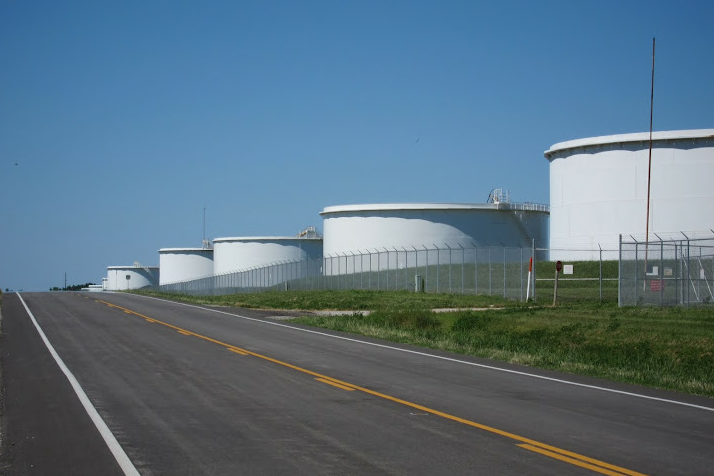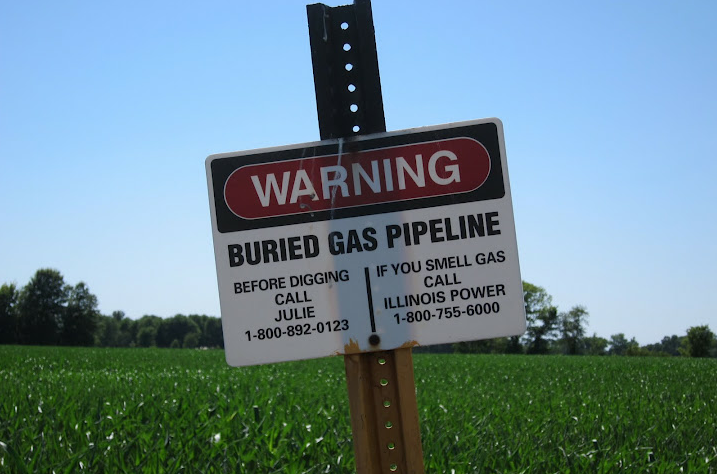Rows of large white cylinders in wire fences plastered with no-trespassing signs and the names of oil companies signaled that I had reached the end terminal of the Keystone pipeline.
Since the end of May, I've been cycling along the Keystone pipeline, interviewing locals, experts and workers in key places to research the impact and role of Canadian oil in the United States. As I was cycling along the U.S. Highway 51 to Patoka, I imagined the village of about 580 people would be an oil town since it sits next to the Patoka tank farm, one of the largest holdings of crude oil in the United States. But while debates and protests about the pipeline expansion and Canadian oil sands have been ongoing in DC and across the US, the majority of the people in this little town could care less.
"Most people here in town don't even know where the oil comes from," said Dave Rogers, pastor of the local Baptist church. While the tank farm provides some jobs for the small town, most of the locals work in other industries and usually in the neighboring towns of Centralia, Salem and Vandalia. The town itself doesn't contain many industries; there are no restaurants, groceries, or clothing stores.

Many workers at the tank farm actually come from out of town, including states like Oklahoma, Texas and Missouri. While most locals aren't directly employed by the tank farms, many are indirectly impacted through work at Foltz Welding, Ltd., a contracting company based in Patoka. Foltz built the Missouri and Illinois pump stations of the existing Keystone pipeline, said Foltz operation manager Jeff Lauritzen.
As for taxes, Patoka doesn't receive much since much of the tank farm lies outside the city limits, which encircles an area of about one square mile. But after a tax reassessment within the last year, the tank farm will have to start paying real estate taxes to other local governmental entities like the 36-square mile Patoka Township, which maintains local roads and bridges, and the 102.75-square-mile Patoka school district. "[The oil companies] said the tanks were temporary or portable, so they were taxed as such," Patoka Mayor Stacy Hood said. After the reassessment, the school district received about $290,000 in taxes from the tank farm, which hadn't been reassessed since 1947.
Other than the school district and some economic effects, most of the people in Patoka aren't affected by the pipeline or the tank farm. The tank farm, having been here since the 1940s when there was an oil boom in Illinois, was always part of the scenery, said Melissa Gramlick, a journalist for the local paper.

As for the underground Keystone pipeline that was complete in 2010, the locals seem fine with it, said Craig Griffin, a lawyer in Patoka. "All you see is a gap between the trees and the sign to mark the pipeline's right of way," he said, pointing to the location of the buried pipeline. "It's still private property, but there can't be any trees over it," he said. And there are more pipelines than just the Keystone running through Patoka, he added.
While the tank farm and pipeline don't influence the lives of people in Patoka very much, they are still national security concerns, as I found out after being pulled over by a county officer. He had been alerted that a girl on a bicycle had been taking pictures of the tank farm. Security for the energy industry has been increased since 9/11, not as much for this tank farm because it's not close to any ports. But if it were to be attacked, not only would there be an explosion, but a shortage in oil, higher oil prices and a slower economy.
I was allowed to leave after the officer recorded the incident. I took more pictures of the tank farms to finish my research in Patoka and left for the next strategic Keystone destination: Roxana, IL.